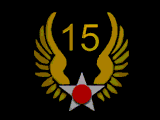|
|
Sgt. Joseph E. Marshall
721st Squadron
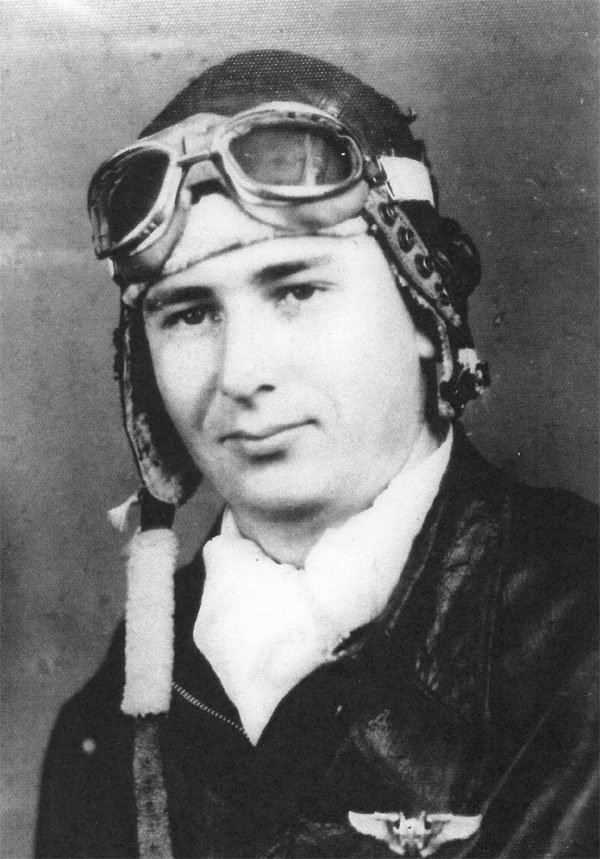
Sgt. Joseph Edgar Marshall
|
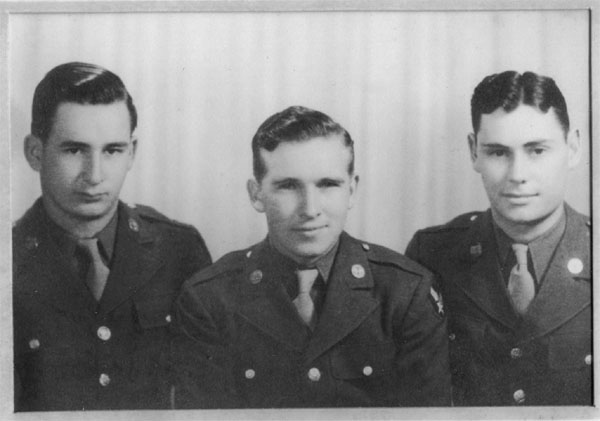
Left to Right - Unknown, Marshall & William E. Green
Cedar Falls, Iowa - 1943
|
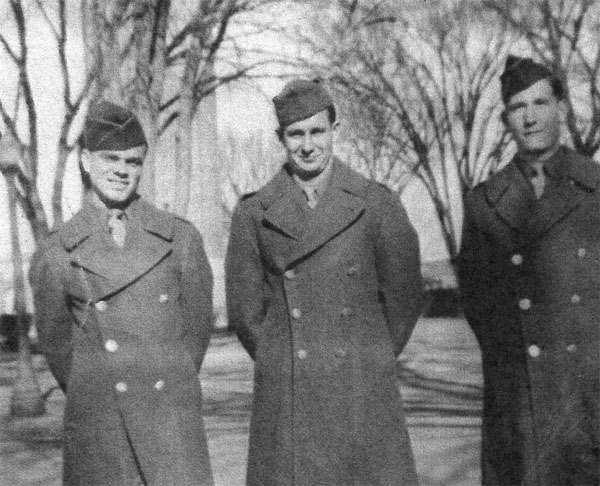
Marshall is in the middle. Other two are unknown at this time.
|
Aug. 1943, I was drafted in service at
Ft. Sam Houston San Antonio, Texas. I qualified for Cadet training and was
sent to Shephard Field Wichita Falls, Texas. Nov. 1943 I was assigned to
C.T.D. (College Training Detachment) at Iowa State Teachers College in Cedar
Falls, Iowa. We took college courses in Math, English, History, and Geometry.
I got my one and only flying lesson in an L-5. (light observation airplane,
similar to Piper Cub)
In early 1944 the Army Air Corps decided
it had too many cadets in training. They washed out 2,000 at one time. I was
then sent to gunnery school at Yuma, Arizona. After gunner school I was sent to
crew training at Casper, Wyo. This is where you are put on a ten man crew. I
was picked as tail gunner on a B-24 crew.
After training as a crew we picked up a
new B-24 at Topeka, Kan. We then flew to Bangor, Maine, from there to the
Bermuda Islands, then to the Azores, then to North Africa and finally on to
Italy. We went to the 15th Air Force – 450th Bomb Group
– 721st Squadron at Manduria, Italy.
You first fly with an experienced crew.
I flew my first mission with the Group Commander, a Colonel. On my second
mission I flew with another crew. We hit a target in Germany I thought it was
an easy mission. When we landed part of my crew was down to see me back. They
asked about the mission I said it was not too bad. We walked around the plane
checking for holes. I looked at my turret and found a hole about the size of a
half dollar, where the shrapnel went through the bottom and out the top. The
next mission I had half of a flak suit in the floor, under my feet, and the
other half to sit on, along with the one I wore. A flak suit was like a bullet
proof vest on your chest and back. We also had a flak helmet. You have seen a
turtle draw up into his shell, well I could do this in my flak suit and
helmet.
We flew missions into Germany, Austria,
and northern Italy. Our most important mission was an oil refinery at Vienna
Austria. The Nazis were getting much of their fuel from the refinery at
Austria. I flew 4 or 5 of my 13 missions to Vienna. Hot Target! We had no
fighter opposition but the anti-aircraft was really something else. We would
go in at 30,000 ft. and their shells would be bursting right in our laps. We
bombed railroad yards and railroad bridges to stop the movement of supplies and
troops. We went on one mission to an airfield in Munich, Germany, we would
drop clusters of small bombs to destroy any aircraft on the ground. After each
mission they would send in Recon planes and take photos.
They showed us pictures of one of our
missions to a Railroad yard in Germy. The before shot was of several trains on
switch tracks, the after shot was like moon craters, nothing left. On one
mission we hit a railroad bridge and all of our bombs missed, but he next day
the bridge fell in. We had hit the bank and caused the piers that the bridge
rests on, to fall. After each mission they would give every crew member 2
shots of liquor. Four of our crew did not drink, so Frank Kovac and I would
carry an empty bottle with us, receive their share, and save the 8 shots for
later. We would drink our 2 shots on an empty stomach, you felt good.
On April 8th, 1945 (my 13th)
we flew on a mission to a railroad bridge in upper Italy. The Brenner Pass. We
got hit in the # 3 engine and we lost a lot of altitude. We were down behind
the mountains, and could not get back to our base.
The pilot had a hard time controlling
the plane. He gave the order to bail out. The tail gunner was to be the first
to bail out. I opened the hatch, an opening in the rear of the plane, and all
I could see was snow capped mountains. At that time the pilot called back not
to bail out. That was close. Our target was not far from lake between
Switzerland and Italy. The pilot said he thought he could get us to
Switzerland. This was better than a German prison camp. Switzerland was a
neutral county. If you went to Switzerland during the war you became their
prisoner.
As we crossed the lake the Swiss fighter
plane came to check us out. Your must lower your landing gear and open your
Bombay doors, fire off a green flare to show you were friendly and a red flare
if you had wounded aboard. Frank Kovak, our radio operator, was wounded in the
leg. The Swiss fighter planes led us to a small field near Zurich. We landed
on a open field, as we landed the Swiss army surrounded our plane with machine
guns. The Swiss people were nice to us. The Red Cross notified our base and
next of kin in the states that we were safe in Switzerland. They took us to a
small town up in the Alps, Adelboden, this was a ski resort. We lived in a
small hotel, compared with what we had in Italy this was like heaven.
More Notes on the April 8th,
1945 mission.
The 450th Bomb Group took off
at 7:30 a.m. on April 8, 1945 on a mission to bomb the railroad bridge at
Vipiteno, Italy. The bombs were dropped at 11:35 a.m. Within minutes, we were
hit with flak and it took out our number 1 engine on our B-24 Liberator. We
dropped out of formation as we were losing altitude fast. Pilot, Lieutenant
Richard Turk gave orders to bail out. I unhooked the intercom from my head
gear and hooked on my parachute as the tail gunner is one of the first to bail
out. I made my way to the waist gunner position and was preparing to jump when
someone tapped me on my shoulder and said to not jump. Pilot Lieutenant Turk
and Co-Pilot Vincent Hanrahan had gained control of our aircraft and thought
they could keep our plane flying even though we were still losing altitude. We
were behind the mountains and could not get over them in order to return to our
base. Pilot Turk requested the navigator to obtain a fix on friendly airfields
in the area. The navigator determined that the closest friendly airfields were
in Switzerland. The pilot and co-pilot were able to fly our aircraft –
appropriately name "STRANGE CARGO" – TO THE Switzerland border. We were
challenged by a German made ME-109 with Swiss markings when we crossed into Switzerland's
airspace. He communicated with us and told us to follow him and to open our bombay
doors to see if we were carrying any bombs. He flew us over the runway where
we could land. We proceeded to land on this grass runway. A Swiss truck with
several soldiers arrived at our location as soon as we came to a halt. They
surrounded us and a Swiss Officer with a bull horn advised us that we were in Switzerland
and would be considered Internees/ POW's. They took away our .45 automatics
and took us to the Officers building and asked a lot of questions. We would
only give them our name, rank and serial number. Lieutenant Turk came in and
advised us that we could give them our home address and next of kin. This was
done in order for them to notify the Red Cross that we were in Switzerland and
not injured. My wife was notified that I was in Switzerland. We were
quartered in the Nevada hotel in Adleboden, Switzerland. We were treated very
well during the time we were interned. Germany surrendered on May 9th,
1945. Shortly after their surrender, we were transported to Le Havre, France,
and then shipped home. I consider myself blessed during this experience.
Overall, my military duty was a good experience.
On May 7th, 1945 the war in
Europe was over. We were happy but wondered what we were going to do. We were
told we would have to stay in Switzerland until the war with Japan was over we
told them we were walking out on a certain day. On about May 14 or 15 they
took us by train to the French border and turned us over to the U. S. Army.
They flew us to LaHarve, France with all the P.O.W.s.
About June 1, I sailed for the U.S. 15
days at sea was not good. I arrived in Smithville, Tx. the last part of June,
1945. I was home for about 3 months. The war with Japan was over Sept. 2,
1945. I was sent to Santa Monica, Calif. to be reassigned. They then sent me
to Ellington Field Houston, Tx. and in Nov. I was discharged. HAPPY DAY!
|
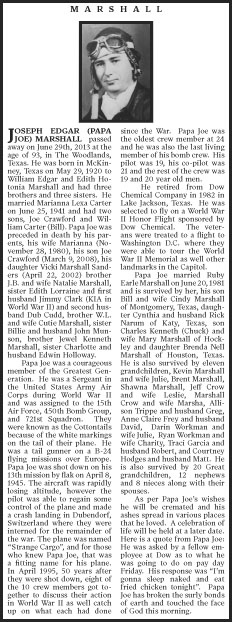
Obituary Notice
|
Information courtesy of Joe Marshall
Link To Crew Information
|
